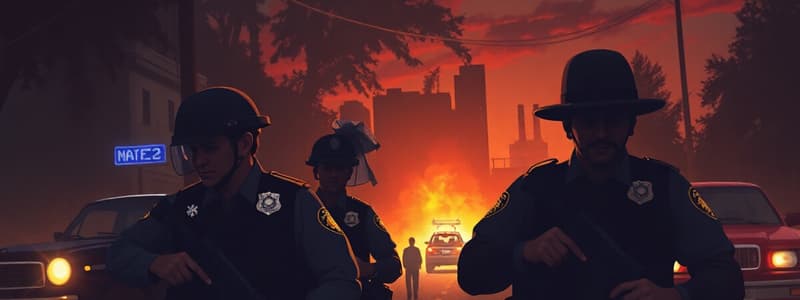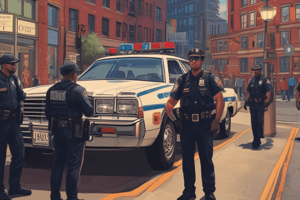Podcast
Questions and Answers
Match the historical event with its approximate period:
Match the historical event with its approximate period:
GI Bill = Mid-1940s Civil Rights Movement = 1950s-1960s War on Drugs = 1970s-1980s For-profit Prison Systems gain traction = 1980s
Match the movement with its primary focus:
Match the movement with its primary focus:
Civil Rights Movement = Achieving legal and social equality for African Americans Black Power Movement = Emphasizing racial pride and self-determination American Indian Movement = Advocating for Native American rights and sovereignty AAPI Movement = Addressing discrimination and promoting rights for Asian Americans and Pacific Islanders
Match the legislative or policy initiative with its primary impact:
Match the legislative or policy initiative with its primary impact:
GI Bill = Expanded access to education and housing for veterans War on Drugs = Led to increased incarceration rates and drug-related arrests For-profit Prison Systems = Increased prison privatization, raising ethical concerns Civil Rights Act = Outlawed discrimination based on race, color, religion, sex, or national origin
Match the policing era with descriptions:
Match the policing era with descriptions:
Match the movement with its associated concept:
Match the movement with its associated concept:
Match each movement to its main demands:
Match each movement to its main demands:
Match the movement with its period:
Match the movement with its period:
Match each era to the concept of policing that drove it:
Match each era to the concept of policing that drove it:
Match each era with its key characteristics:
Match each era with its key characteristics:
Match the legislative action with its time context:
Match the legislative action with its time context:
Flashcards
GI Bill (1944)
GI Bill (1944)
Provided benefits to returning World War II veterans, including education, housing, and employment assistance.
Civil Rights Movement (1950s-1960s)
Civil Rights Movement (1950s-1960s)
A social movement in the United States with the goal of ending racial segregation and discrimination against African Americans and to secure legal recognition and federal protection of the citizenship rights.
Black Power Movement (Mid 1960s)
Black Power Movement (Mid 1960s)
A political movement advocating for the rights and empowerment of Black people in the United States.
American Indian Movement (1968)
American Indian Movement (1968)
Signup and view all the flashcards
AAPI Movement (late 1960s)
AAPI Movement (late 1960s)
Signup and view all the flashcards
War on Drugs (1971-80s)
War on Drugs (1971-80s)
Signup and view all the flashcards
For-profit prison systems (1980s)
For-profit prison systems (1980s)
Signup and view all the flashcards
Black Lives Matter Movement (2010-2020)
Black Lives Matter Movement (2010-2020)
Signup and view all the flashcards
Civil Unrest in COVID (2020)
Civil Unrest in COVID (2020)
Signup and view all the flashcards
Study Notes
- Key historical events and movements in American policing:
GI Bill (1944)
- Provided benefits to World War II veterans, including home loans, education, and employment opportunities.
Civil Rights Movement (1950s)
- Sought to end segregation and discrimination against African Americans and achieve equal rights under the law.
Black Power Movement (Mid 1960s)
- Advocated for self-determination, racial pride, and economic empowerment for African Americans.
American Indian Movement (1968)
- Focused on Native American rights, tribal sovereignty, and cultural preservation.
AAPI Movement (late 1960s)
- Addressed the unique challenges and discrimination faced by Asian Americans and Pacific Islanders, advocating for social justice and equality.
War on Drugs (1971-80s)
- Government initiative aimed at combating illegal drug use and trafficking, leading to increased arrests and incarceration rates, particularly among minority communities.
For-Profit Prison Systems (1980s)
- Emergence of private companies managing correctional facilities for profit, raising concerns about incarceration rates and potential conflicts of interest.
Black Lives Matter Movement (2010-2020)
- Protested police brutality and systemic racism against African Americans, advocating for police reform and racial justice.
Civil Unrest in COVID (2020)
- Triggered by the murder of George Floyd, widespread protests and unrest erupted across the United States, highlighting issues of racial inequality and police violence.
Studying That Suits You
Use AI to generate personalized quizzes and flashcards to suit your learning preferences.




